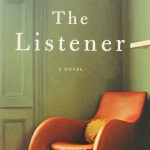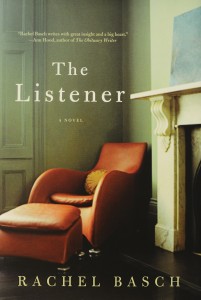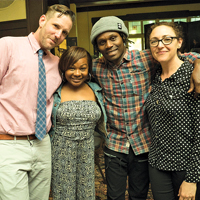BETWEEN THE LINES: MY CHARACTERS, MYSELF

 In her essay “Revision as Creation,” May Sarton wrote, “… what is the value of the finished work compared to what… [the writer] has found out on the journey of its making.” In the 10-plus years it took me to complete my third novel, The Listener, I had ample time to commit Sarton’s statement to memory. On good days I intoned it like a mantra. On bad days it resounded like a desperate plea.
In her essay “Revision as Creation,” May Sarton wrote, “… what is the value of the finished work compared to what… [the writer] has found out on the journey of its making.” In the 10-plus years it took me to complete my third novel, The Listener, I had ample time to commit Sarton’s statement to memory. On good days I intoned it like a mantra. On bad days it resounded like a desperate plea.
The initial germ for The Listener presented itself to me while I was finishing up my second novel, The Passion of Reverend Nash. During the four years I worked on that book, which is about a female minister, I spent my Sunday mornings in a variety of Protestant churches. Like some cheesy double agent, I would slink down the side aisle, jot notes in the margins of the bulletin during the service, and then bolt before the folks from the membership committee spotted me. On one of my last Sundays spent conducting research, I found myself seated behind a teenager. The church was crowded, but a sea of space surrounded this kid. No parents or grandparents, siblings, or friends from youth group. Like me, he’d come alone. But unlike me, his aim was not invisibility. Long-limbed and exceptionally graceful, he was dressed in tight jeans and a colorfully printed shirt, which folks of a certain age might refer to as a “blouse.” I stared at the metallic blue polish on his fingernails as he gripped the hymnal, singing each hymn with full-throated commitment. His insistence on his individuality within this communal worship experience thrilled my every narrative neuron. But when he extended his hand toward me during the greeting, my fascination with his dress and my awe at his confidence yielded to a split second of recoil. I recognized my need to categorize, to label and separate myself from this kid in the pew in front of me as the seed of all violence. My own mean reaction disgusted and confused me, and I knew I would have to investigate it. Unfortunately, I’ve developed the time-consuming habit of writing novels as the chief means by which I attempt to unknot what confounds me.
The Listener is told alternately from two perspectives, that of Noah Burrell, a college freshman who considers himself somewhere on the gender spectrum, and Malcolm Dowd, Noah’s therapist. It never occurred to me to write a novel about someone who was genderqueer. I doubt I’d heard that term when I began the book. Rather, my aim was to write a character who identifies only as himself. Each year I spent with this character, the closer I got to comprehending the conviction that forged him, the belief that he cannot let other people define him. His vulnerability, his uncertainty, the qualities that initially allowed me to relate to him, are, largely, external and by the end of the novel, largely, cast off. In one of his early sessions with Dowd he rants, “‘Be yourself, be yourself, be yourself…. What if my self, my real self, what if there’s no place for that?’” By the end of the book, Noah will realize that it’s up to him to carve out that place for himself.
It was in plumbing the character of Dowd, the middle-aged therapist and father of two young adult daughters, that I stumbled on a clue to my own intolerance. While Dowd is fond of telling his patients he’s in the truth business, he’s kept a pretty big truth from his own daughters, rightly or wrongly so, as a way of shielding them and himself. Repeated tragedy has trained him to duck and cover. He is, like a lot of us, living his life looking backward, unable to create anything new, incapable of escaping the orbit of loss. Each of the chapters I wrote from Noah’s perspective were as much an exercise in joy as any writing I’ve ever done. Those from Dowd’s point of view proved a kind of heavy lifting not usually associated with sitting at a desk. Writing from inside Noah’s experience allowed me to take up space in a way I would never dare in my walking around life. Quite late into the whole decade-plus experience of writing this novel, it dawned on me that my recoil back in that church was, in part, a symptom of envy. How come you get to be yourself and I don’t?
Were May Sarton looking for an answer to her rhetorical question, I would say, the great gift of this ludicrously long writing project was realizing that the sense of possibility that informs Noah belongs to him not because he’s young, but rather because he’s laid claim to it and called it for his own. Here’s hoping a little bit of him has rubbed off on me.

